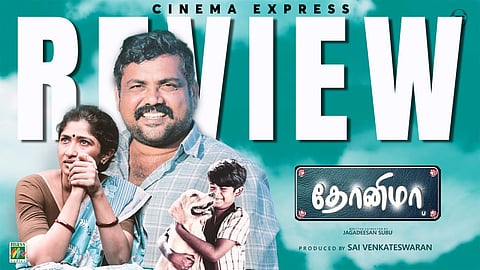Dhonima Movie Review: Even Kaali Venkat’s acting can’t save this meandering drama
Dhonima(2 / 5)
Some filmmakers and actors believe there’s no definitive formula for crafting a winning story. However, certain themes, like any story surrounding a protagonist and their pet dog, are timeless. They often connect deeply, bring a sense of hope and instantly light up the screen. In a similar spirit, director Jagadeesan Subu presents Dhonima, a film surrounding a young, hearing-impaired boy who forges a lifelong relationship with his pet dog as he navigates the challenges of facing poverty and an alcoholic father. Despite having this solid theme, the film wastes the opportunity by providing the audience with an incoherent screenplay that barely brings any warmth to the story.
Cast: Kaali Venkat, Roshni Prakash, Vishav Raj, Vivek Prasanna, Kannan Ponnaiah, Rajesh Sharma, PL Thenappan and Aadukalam Stella
Director: Jagadeesan Subu
Rating: 2/5
Dhonima begins promisingly with captivating scenes. A shot of Dhanam (Roshni Prakash) making smoothie is juxtaposed with a lady struggling to drink milk. Another shot of a person drinking from a tall glass is placed next to a child whose grandfather mixes Bournvita in a small tumbler for him. These cinematic moments are just enough to lure us into the characters and their worlds.
It is hard not to love these characters in Dhonima. Roshni Prakash portrays an independent and resilient Dhanam who works tirelessly as a domestic help. Her meagre savings barely holds together their family of five. Her character is arguably the best written in the film. Then there is Kaali Venkat’s father, an epitome of kindness, who cares for his wife every day since she suffers from paralysis in one arm and leg. Yet, all these never matter as the supporting characters are weakly written, potentially taking the focus away from the central conflict. Although they may have worked independently as effective subplots if the writing was further polished, they never come together seamlessly to aid the overall story.
For instance, Suganthi and James are a couple who live on their own terms, even if it means being judged by society for choosing a job that is not “respectable,” as defined by social norms. But not once do they strongly stand by their values to James’ mother. They eventually allow the norms to dictate their lives. It is not clear how they bring a substantial change in the lives of Koti and Dhanam’s family, and their value to Dhonima as a whole. A few quirks that are employed by Mani, a dog catcher, bring a few organic laughs, but that too quickly drowns inside the rabbit hole as just another banal character.
Kaali Venkat makes it challenging for us to empathise with him as the alcoholic and lying Koti, and this is a place where he excels as an actor. He is a hate-worthy character and he pulls this off effortlessly. While he is undeniably flawed, the writing of his character is perilously close to making him a criminal who gets away too easily, too soon. This significant logical inconsistency derails the plot and makes it difficult for the audience to fully invest in his redemption arc.
Sometimes, there needs to be special mentions written for animals acting in films. After a spectacular performance by a rooster in Kottukkaali, Dhonima, the golden retriever, deserves a special mention for being an unpaid actor and showering unconditional love to the stars in the cast. She acts on cue and even shows her affection to Dravid’s ill grandmother when the woman cries. Too many aww-filled moments. But as the story goes all over the place, the conflicts that arise from Koti’s behaviour and the family’s destitution are easy to anticipate. They come across as amateurish, relying on overused tropes that feel tired.
Dhonima has its heart in the right place and holds great potential to become a heart-winning drama. However, its meandering screenplay makes it difficult to stay focused on both the central plot and the emotional depth of the characters. While Koti and Dhanam’s biggest obstacle may be poverty, Dhonima’s true shortcoming isn’t its predictability but rather its storyline, which is trite and not strong enough to truly resonate.

